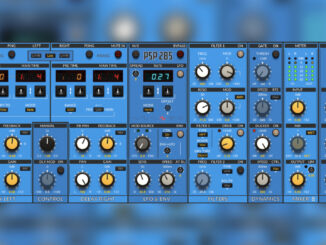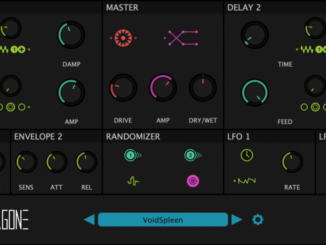MagicDelay by Gustav Scholda (GS DSP) is a new spectral delay that pairs high-level complexity with an inspiring & easy-to-use user interface.
There are tons of delay plugins on the market. From simple bread and butter processor up to very complex ones with granular or spectral synthesis. Often one notices: the more complex it gets, the less attractive the operation becomes, since they often packed too many features in a processor.
Gustav Scholda from GS DSP takes a different route with his latest plugin release MagicDelay. Yes, it’s a very mighty delay with a lot of complexity, but it promises not to overwhelm the user. Mainly through simplification.

Do we need yet another delay? Of course. We need thousands of delays all working in concert and in high fidelity. That’s why we bring you MagicDelay, the multi-curve spectral delay with a built-in modulation system. Easily and quickly create separate delay times per frequency, or ranges of frequencies. Mix them, modulate them, spread them, run wild, and create original beautiful delays to enrich your sounds.
GS DSP MagicDelay
MagicDelay sounds like a perfect marketing name of a plugin. However, this delay is different and special. Well, I’ll leave it to you whether it’s magical or not. Fact is: it is a spectral delay based on a multi-curve engine with a built-in modulation system.
GS DSP wants to make it easier for the user to work with a large number of delay times. This is often very challenging in classic delays. The plugin promises here a very and intuitive workflow, almost magical. The core uses a curve editor that allows you to draw up to 4 separate curves and where you can fluently morph between them using the the XY pad.
Of course, you can easily sync your delay times to your DAW. Pretty unique and novel concept indeed. I think you can get complex delay structures very quickly here
In just a few seconds you can have, for example, a regular eighth delay for the low-mids and a dotted eighth delay for the highs, or any other combination you can think of.
Another highlight of the engine is the built-in straightforward modulation system operable with a few clicks. It offers different modulators including LFOs, random generators, or envelope followers. The latter can be routed to the amplitude, pitch, brightness or even respond to side-chain inputs.
At first glance a very exciting delay plugin with a different concept. Especially the curve editor looks very tempting as it can drive you to very inspiring, experimental results. I think it’s fun in a long run.
GS DSP MagicDelay is available now for an introductory price of $49,99/49,49€.
More information here: GS DSP




Be the first to comment